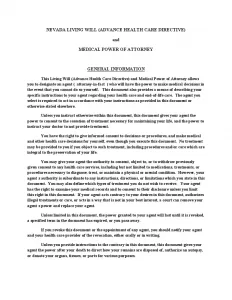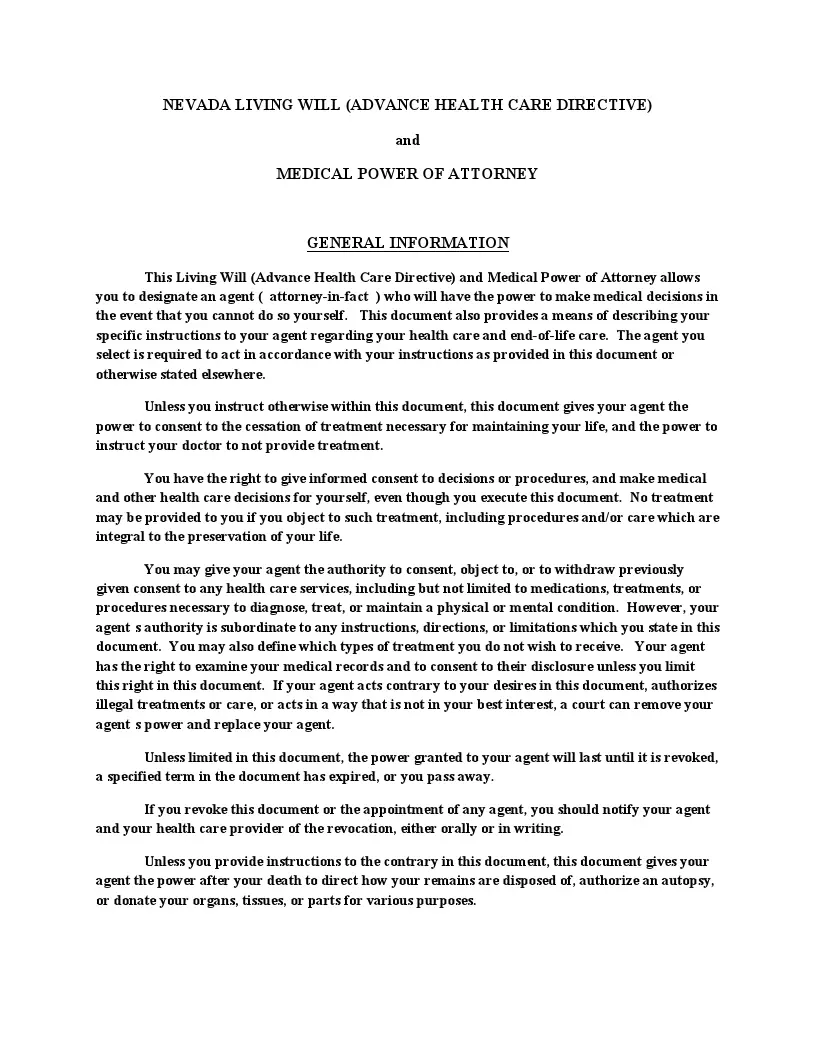Free Nevada Living Will Form
A Nevada living will, also known as an “Advance Directive,” is a legal document that allows individuals to express their wishes regarding medical treatment and end-of-life care in advance should they become unable to communicate their decisions due to illness or incapacity.
The purpose of a living will is to provide instructions on whether or not life-sustaining treatment should be administered if a person becomes terminally ill, incapacitated, or in a persistent vegetative state. Nevada also offers a digital registry where residents can upload their advance directives so that healthcare providers can access them as needed.
Signing Requirements and Laws
In Nevada, the legal requirements for a living will are specified under NRS 449A.439. These statutes ensure the document is legally binding and reflects the individual’s authentic wishes concerning their medical treatment and end-of-life care.
In Nevada, the living will must comply with state laws to be valid. This includes signing by the declarant (the person making the will) in the presence of two qualified witnesses, who must also sign the document. These witnesses cannot be related to the declarant by blood, marriage, or adoption, nor can they be entitled to any part of the declarant’s estate upon death.
A living will can be updated or revoked in several ways by the declarant as long as they are considered competent to make such decisions:
- Writing. Creating a new living will or a written statement to revoke the old one.
- Destruction. Physically destroying the document with the intent to revoke it.
- Oral statement. Making an oral declaration in the presence of a witness.
These legal requirements ensure that the individual’s current wishes regarding medical treatment are respected, even if those wishes change over time.
Nevada Living Will Form Details
| Document Name | Nevada Living Will Form |
| State Form Name | Nevada Advance Directive / Declaration |
| Signing Requirements | Two Witnesses |
| Validity Requirements | NRS 449A.439 |
| State Laws: Nevada Revised Statutes, Sections 449A.400 to 449A.481 | |

Steps to Fill Out the Form
Following these steps, you can quickly fill out the Nevada living will form to ensure that your healthcare preferences are documented and will be followed.
1. Read the General Information
Understand the powers you grant to your agent and the scope of decisions they can make regarding your health care. This section explains your agent’s responsibilities and the limits of their authority.
2. Appoint Your Health Care Agent
In the declaration, you must appoint a primary agent to make decisions on your behalf. Write their name in the first blank. If you want a backup agent in case the primary agent is unavailable or unwilling to serve, write their name in the second blank.
3. Review and Decide on Artificial Nutrition and Hydration
Decide whether you want to receive artificial nutrition and hydration if all other treatments are withheld. Initial the box provided if you wish to receive or continue receiving artificial nutrition and hydration via the gastrointestinal tract.
4. Date and Sign the Document
Sign and date the document in the provided spaces. Write the current day, month, and year. Then, sign your name and provide your address in the designated lines.
5. Witness Signatures
Have two witnesses present when you sign the document. Each witness must sign and provide their addresses in the designated spaces, confirming that you voluntarily signed the form in their presence.
6. Provide Names and Addresses of Designees
List the names and addresses of the individuals you have appointed as your health care agents. This ensures that your appointed agents are identified and can be contacted when necessary.

Below are various other Nevada templates completed by our users. Try our simple builder to customize these forms to your preferences.
Other Living Will Forms by State
